 Political Theory
Political Theory  Andrew Heywood Political Theory An Introduction 4th edition Andrew Heywood 1994, 1999, 2004, 2015 All rights reserved. No reproduction, copy or transmission of this publication may be made without written permission. No portion of this publication may be reproduced, copied or transmitted save with written permission or in accordance with the provisions of the Copyright, Designs and Patents Act 1988, or under the terms of any licence permitting limited copying issued by the Copyright Licensing Agency, Saffron House, 6-10 Kirby Street, London EC1N 8TS. Any person who does any unauthorized act in relation to this publication may be liable to criminal prosecution and civil claims for damages. The author has asserted his right to be identified as the author of this work in accordance with the Copyright, Designs and Patents Act 1988. First edition published 1994 under the title Political Ideas and Concepts: An Introduction Second edition published 1999 Third edition published 2004 Fourth edition published 2015 Published by PALGRAVE Palgrave in the UK is an imprint of Macmillan Publishers Limited, registered in England, company number 785998, of 4 Crinan Street, London N1 9XW Palgrave Macmillan in the US is a division of St Martins Press LLC, 175 Fifth Avenue, New York, NY 10010.
Andrew Heywood Political Theory An Introduction 4th edition Andrew Heywood 1994, 1999, 2004, 2015 All rights reserved. No reproduction, copy or transmission of this publication may be made without written permission. No portion of this publication may be reproduced, copied or transmitted save with written permission or in accordance with the provisions of the Copyright, Designs and Patents Act 1988, or under the terms of any licence permitting limited copying issued by the Copyright Licensing Agency, Saffron House, 6-10 Kirby Street, London EC1N 8TS. Any person who does any unauthorized act in relation to this publication may be liable to criminal prosecution and civil claims for damages. The author has asserted his right to be identified as the author of this work in accordance with the Copyright, Designs and Patents Act 1988. First edition published 1994 under the title Political Ideas and Concepts: An Introduction Second edition published 1999 Third edition published 2004 Fourth edition published 2015 Published by PALGRAVE Palgrave in the UK is an imprint of Macmillan Publishers Limited, registered in England, company number 785998, of 4 Crinan Street, London N1 9XW Palgrave Macmillan in the US is a division of St Martins Press LLC, 175 Fifth Avenue, New York, NY 10010.
Palgrave is a global imprint of the above companies and is represented throughout the world. Palgrave and Macmillan are registered trademarks in the United States, the United Kingdom, Europe and other countries ISBN 978-1-137-43726-6 hardback ISBN 978-1-137-43727-3 paperback This book is printed on paper suitable for recycling and made from fully managed and sustained forest sources. Logging, pulping and manufacturing processes are expected to conform to the environmental regulations of the country of origin. A catalogue record for this book is available from the British Library. A catalog record for this book is available from the Library of Congress. Oscar Wilde, An Ideal Husband When I use a word, Humpty Dumpty said, in rather a scornful tone, it means just what I choose it to mean. Oscar Wilde, An Ideal Husband When I use a word, Humpty Dumpty said, in rather a scornful tone, it means just what I choose it to mean.
Neither more or less. The question is, said Alice, whether you can make words mean so many different things. The question is, said Humpty Dumpty, who is the master. That is all. Lewis Carroll, Alice in WonderlandSummary of Contents vii ContentsPreview ix x | CONTENTS C O N T E N T S | xi xii | CONTENTS C O N T E N T S | xiii xiv | CONTENTS List of Illustrative MaterialTraditions Absolutism Communitarianism Conservatism Cosmopolitanism Critical theory Democracy Feminism Green political thought Liberalism: the classical tradition Libertarianism Marxism Modern liberal thought Multiculturalism Nationalism Postcolonialism Postmodernism Rational-choice theory Realism Republicanism Social democracy Utilitarianism Utopianism Featured Thinkers Adorno, Theodor Anderson, Benedict Aquinas, Thomas xv xvi | LIST OF ILLUSTRATIVE MATERIAL Archibugi, Daniele Arendt, Hannah Aristotle Augustine, of Hippo Bahro, Rudolph Barber, Benjamin Beauvoir, Simone de Beck, Ulrich Beitz, Charles Bentham, Jeremy Berlin, Isaiah Bernstein, Eduard Beveridge, William Bodin, Jean Bookchin, Murray Buchanan, James Burke, Edmund Carr, E. (Edward Hallett) Constant, Benjamin Crosland, Anthony Dahl, Robert Derrida, Jacques Downs, Anthony Engels, Friedrich Fanon, Franz Filmer, Sir Robert Foucault, Michel Friedan, Betty Friedman, Milton Galbraith, John Kenneth Gandhi, Mohandas Karamchand Garvey, Marcus Gellner, Ernest Godwin, William Goodman, Paul Gramsci, Antonio Green, T. H. (Thomas Hill) Grotius, Hugo Habermas, Jrgen Hayek, Friedrich Hegel, Georg Wilhelm Friedrich Heidegger, Martin L I S T O F I L L U S T R AT I V E M AT E R I A L | xvii Herder, Johann Gottfried Hobbes, Thomas Horkheimer, Max Jefferson, Thomas Kant, Immanuel Keynes, John Maynard Khomeini, Ayatollah Ruhollah Kristol, Irving Kropotkin, Peter Kymlicka, Will Lenin, Vladimir Illich Locke, John Lovelock, James Lyotard, Jean-Franois Machiavelli, Niccol MacIntyre, Alasdair MacKinnon, Catherine A. (Thomas Hill) Grotius, Hugo Habermas, Jrgen Hayek, Friedrich Hegel, Georg Wilhelm Friedrich Heidegger, Martin L I S T O F I L L U S T R AT I V E M AT E R I A L | xvii Herder, Johann Gottfried Hobbes, Thomas Horkheimer, Max Jefferson, Thomas Kant, Immanuel Keynes, John Maynard Khomeini, Ayatollah Ruhollah Kristol, Irving Kropotkin, Peter Kymlicka, Will Lenin, Vladimir Illich Locke, John Lovelock, James Lyotard, Jean-Franois Machiavelli, Niccol MacIntyre, Alasdair MacKinnon, Catherine A.
Madison, James Maistre, Joseph de Malthus, Thomas Mao Zedong Marcuse, Herbert Marx, Karl Mazzini, Giuseppe Mearsheimer, John Merchant, Carolyn Mill, James Mill, John Stuart Millett, Kate Mitchell, Juliet Montesquieu, Charles-Louis de Secondat Morgenthau, Hans Nietzche, Friedrich Niskanen, William A. Nozick, Robert Nussbaum, Martha Oakeshott, Michael Olson, Mancur Owen, Robert Paine, Thomas Parekh, Bhikhu Pateman, Carol xviii | LIST OF ILLUSTRATIVE MATERIAL Plato Pogge, Thomas Proudhon, Pierre-Joseph Rawls, John Ricardo, David Rorty, Richard Rothbard, Murray Rousseau, Jean-Jacques Said, Edward Sandel, Michael Say, Jean-Baptiste Schmitt, Carl Schumacher, Ernst Friedrich Schumpeter, Joseph Singer, Peter Smith, Adam Spencer, Herbert Stirner, Max Tawney, Richard Henry Taylor, Charles Thucydides Tocqueville, Alexis de Trotsky, Leon Tully, James Waldron, Jeremy Waltz, Kenneth Walzer, Michael Wollstonecraft, Mary Beyond the West The Buddhist doctrine of no-self The Islamic state Indigenous peoples as First Nations Confucianism and authority Democracy in African political thought Daoism and natural harmony Asian values The Indian doctrine of karma Liberation theology in Latin American thought L I S T O F I L L U S T R AT I V E M AT E R I A L | xix Buddhist economics The Islamic idea of jihad The Maoist revolutionary tradition in China Thinking globally World society Global governance Cultural globalization Global hegemony Cosmopolitan democracy World law Global citizenship Cosmopolitan multiculturalism Global social justice Global capitalism Global security Globality Table The development of Western political thought Preface to the Fourth Edition The aim of this book is to provide a primer in political theory by exploring the use and significance of the major concepts encountered in political analysis, clustered into related groups. In addition to general updating throughout, three broad changes have been made for this new edition. First, the focus of the book has been extended to take a much fuller account of the international/global dimension of politics, reflecting the fact that the disciplinary divide between politics and international relations has become increasingly difficult to sustain. In this light, a new chaptecurity, War and World Order) deals with conceptual and theoretical issues related to key aspects of world politics. Thinking globally features have been introduced to consider where, how and how meaningfully political ideas and concepts have been revised in the light of globalizing trends (global governance, cosmopolitan democracy, global social justice and so o has been revised to include a discussion of both the concept of transnationalism and the implications of nationalism for world politics.
New tradition boxes have also been included on cosmopolitanism, nation alism and realism. Second, greater attention has been paid to non-Western and postcolonial approaches to political theory, helping to temper (but certainly not remove alto gether) the books essentially Western-centric orientation. Beyond the West features have been introduced, each of which examines a particular non Western approach to the topic or issue under consideration, drawing on Islamic, Buddhist, Chinese, Indian, African, Latin American and other traditions of thought. A new tradition box has also been added focusing on postcolonialism. Third, the focus on the politics of difference has been expanded, in the light of the increased salience of the issues of identity and diversityeen revised to reflect in greater depth on the concept of identity, allowing for, among other things, a consideration of important debates about gender and multicul turalism. Among the other changes in this edition are a more extensive discussion of the nature and development of political theor, and the inclusion of questions for discussion at the end of each chapter.
Next page
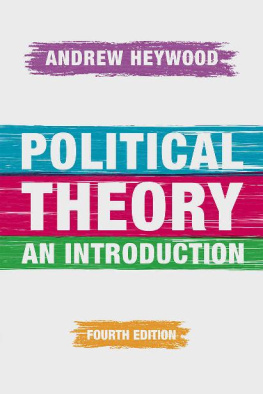
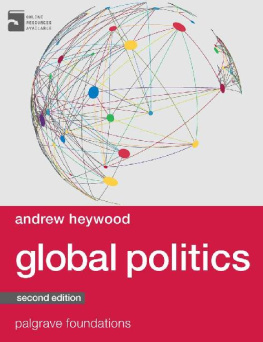
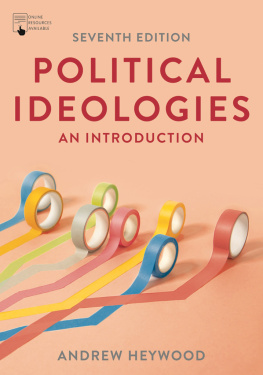
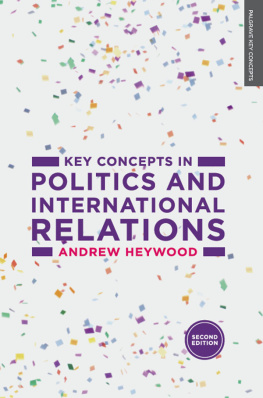
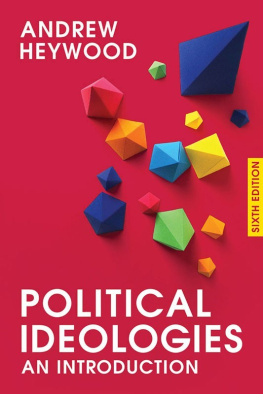
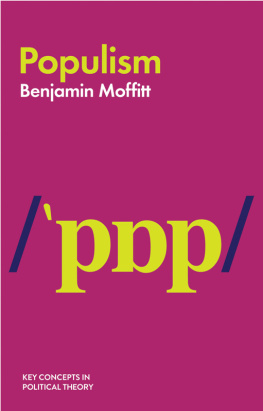
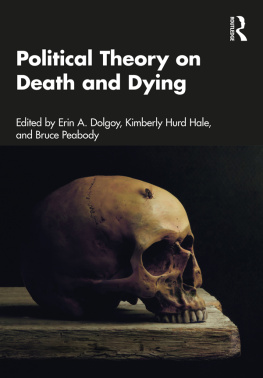
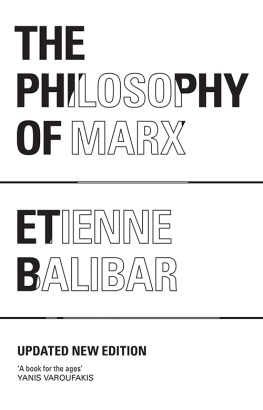
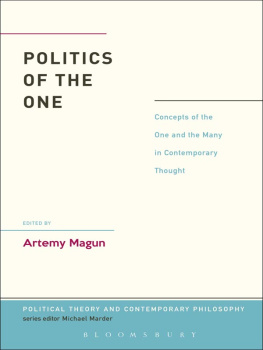
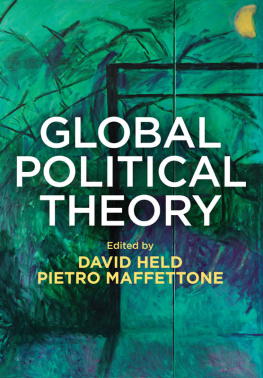

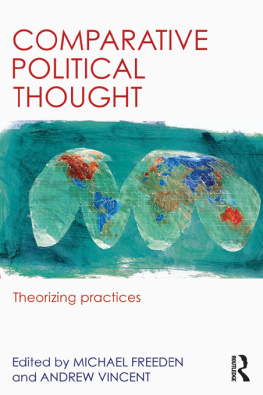
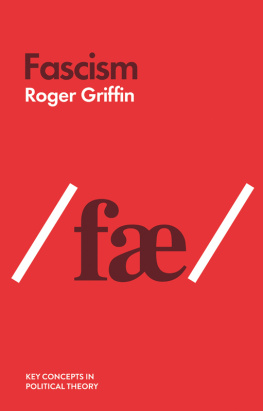
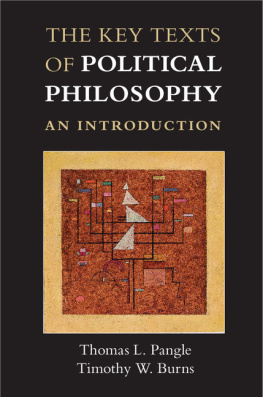
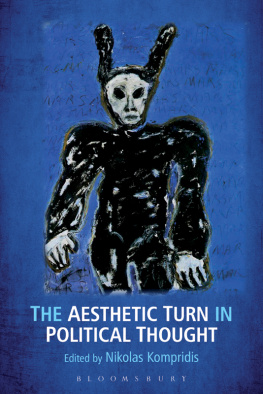
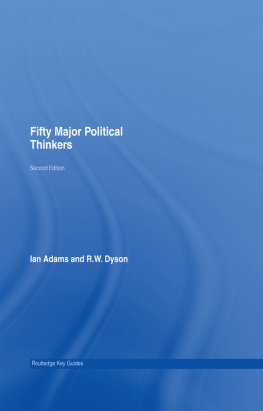
 Political Theory
Political Theory  Andrew Heywood Political Theory An Introduction 4th edition Andrew Heywood 1994, 1999, 2004, 2015 All rights reserved. No reproduction, copy or transmission of this publication may be made without written permission. No portion of this publication may be reproduced, copied or transmitted save with written permission or in accordance with the provisions of the Copyright, Designs and Patents Act 1988, or under the terms of any licence permitting limited copying issued by the Copyright Licensing Agency, Saffron House, 6-10 Kirby Street, London EC1N 8TS. Any person who does any unauthorized act in relation to this publication may be liable to criminal prosecution and civil claims for damages. The author has asserted his right to be identified as the author of this work in accordance with the Copyright, Designs and Patents Act 1988. First edition published 1994 under the title Political Ideas and Concepts: An Introduction Second edition published 1999 Third edition published 2004 Fourth edition published 2015 Published by PALGRAVE Palgrave in the UK is an imprint of Macmillan Publishers Limited, registered in England, company number 785998, of 4 Crinan Street, London N1 9XW Palgrave Macmillan in the US is a division of St Martins Press LLC, 175 Fifth Avenue, New York, NY 10010.
Andrew Heywood Political Theory An Introduction 4th edition Andrew Heywood 1994, 1999, 2004, 2015 All rights reserved. No reproduction, copy or transmission of this publication may be made without written permission. No portion of this publication may be reproduced, copied or transmitted save with written permission or in accordance with the provisions of the Copyright, Designs and Patents Act 1988, or under the terms of any licence permitting limited copying issued by the Copyright Licensing Agency, Saffron House, 6-10 Kirby Street, London EC1N 8TS. Any person who does any unauthorized act in relation to this publication may be liable to criminal prosecution and civil claims for damages. The author has asserted his right to be identified as the author of this work in accordance with the Copyright, Designs and Patents Act 1988. First edition published 1994 under the title Political Ideas and Concepts: An Introduction Second edition published 1999 Third edition published 2004 Fourth edition published 2015 Published by PALGRAVE Palgrave in the UK is an imprint of Macmillan Publishers Limited, registered in England, company number 785998, of 4 Crinan Street, London N1 9XW Palgrave Macmillan in the US is a division of St Martins Press LLC, 175 Fifth Avenue, New York, NY 10010.